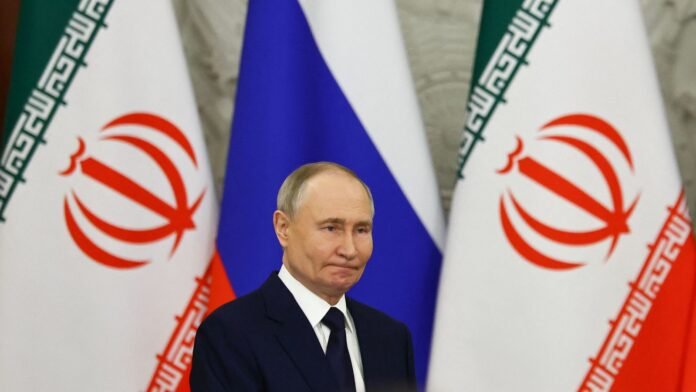Donald Trump’s decision to attack Iran could trigger a wider regional or even global war, but much will hinge on how Russia and China – Tehran’s most powerful allies – respond.
Abbas Araghchi, the Iranian foreign minister, said he will hold “serious consultations” with Vladimir Putin on Monday morning in Moscow.
His country is also in contact with Beijing.
Israel-Iran live: ‘Incredible success’ of US strikes on Iran hailed by Hegseth
Russia, China, Iran, and North Korea are regarded by Western allies as a new axis of authoritarian powers, increasingly aligned and supportive of each other.
Donald Trump, though, has broken ranks from his country’s traditional democratic partners to forge a closer relationship with Mr Putin than any other US leader in recent years.
How much that might affect the Kremlin’s calculations, as Moscow weighs up how to respond to his actions in Iran, adds a new layer of unpredictability to the crisis.
Another limiting factor is the Russian military’s physical capacity – should it wish – to bolster Iran with military support given its war in Ukraine.
Unlike the NATO alliance, there is no formal agreement between Moscow, Beijing, Tehran, and Pyongyang to come to each other’s assistance in a crisis.
However, the weakening of one member of the quartet would impact on the vital national interests of the other three, making it mutually beneficial to help each other out – including with military force or at the very least by supplying weapons.
Iran has little choice but to retaliate directly against the United States after three of its main nuclear facilities were struck overnight.
But its ability to launch ballistic missiles and drones has been severely degraded by waves of Israeli strikes since Prime Minister Benjamin Netanyahu went to war with Iran a week and a half ago.
Read more:
What we know about US strikes on Iran’s nuclear facilities
Analysis: Has Iran lost its ability to make a nuclear bomb
What are Iran’s options?
US bases, warships, and aircraft across the region are well within range of Iranian missiles and drones, but the Pentagon has significantly strengthened its air defences in anticipation of an Iranian counterattack.
There are plenty of softer targets, though, such as American embassies or other diplomatic missions.
Iran could also choose to mine the Strait of Hormuz – a move that would have global ramifications by disrupting the flow of large amounts of oil and gas, as well as other trade.
In addition, the military assets of American allies could be viewed as legitimate targets.
The UK has said it played no part in the US attack.
But Britain’s Ministry of Defence has further increased “force protection” measures for its military bases and personnel in the Middle East to their highest level in the wake of the US strikes, it is understood.
What was hit in US attack?
In an operation that has been in the planning for years, American B-2 stealth bombers dropped enormous bunker-busting bombs – the GBU-57 Massive Ordnance Penetrator – on the Fordow nuclear fuel enrichment plant, around 70 miles (110km) southwest of Tehran.
It was built under a mountain – about 80 to 90 metres beneath the ground – to be beyond the reach of Israel’s armed forces. Only the US Air Force carries munitions large enough to penetrate the rock, earth and concrete to inflict meaningful damage.
Also targeted with the enormous munitions was Iran’s main uranium enrichment facility at Natanz, 155 miles (250km) southeast of the Iranian capital.
In addition, US submarines launched TLAM cruise missiles against Natanz and at a site outside the city of Isfahan, which is 260 miles (420km) south of Tehran. Near-bomb-grade nuclear fuel is thought to be stored here.
The International Atomic Energy Agency (IAEA), the UN’s nuclear watchdog, however, said the six buildings at Isfahan that were hit contained little or no nuclear material.
Mr Trump has said he ordered the attack to destroy Iran’s ability to enrich uranium to a level that could be used to make a nuclear bomb. Tehran has always insisted its nuclear programme is purely for civilian purposes.
Analysts warn, though, that it would be very difficult to stop the Iranian nuclear programme through military action alone and that such a move may spur Iran to accelerate efforts to make a bomb if it has managed to protect key components.
The Russian foreign ministry on Sunday strongly condemned the American strikes against Iranian nuclear sites as a “dangerous escalation” that could further undermine “regional and global security”.
“The risk of an escalation of conflict in the Middle East already beset by multiple crises, has increased significantly,” it said in a statement.
Last week, the Russian government warned the US against joining Israel’s war in Iran, saying this “would be an extremely dangerous step with truly unpredictable negative consequences”.
The remarks came after Mr Putin held a call with his Chinese counterpart, Xi Jinping.
It means the Russian government in particular – given Tehran’s military support to Moscow in the Russian invasion of Ukraine – faces an urgent decision about how to support Ali Khamenei, Iran’s supreme leader, whose very existence is under threat from Israel.














